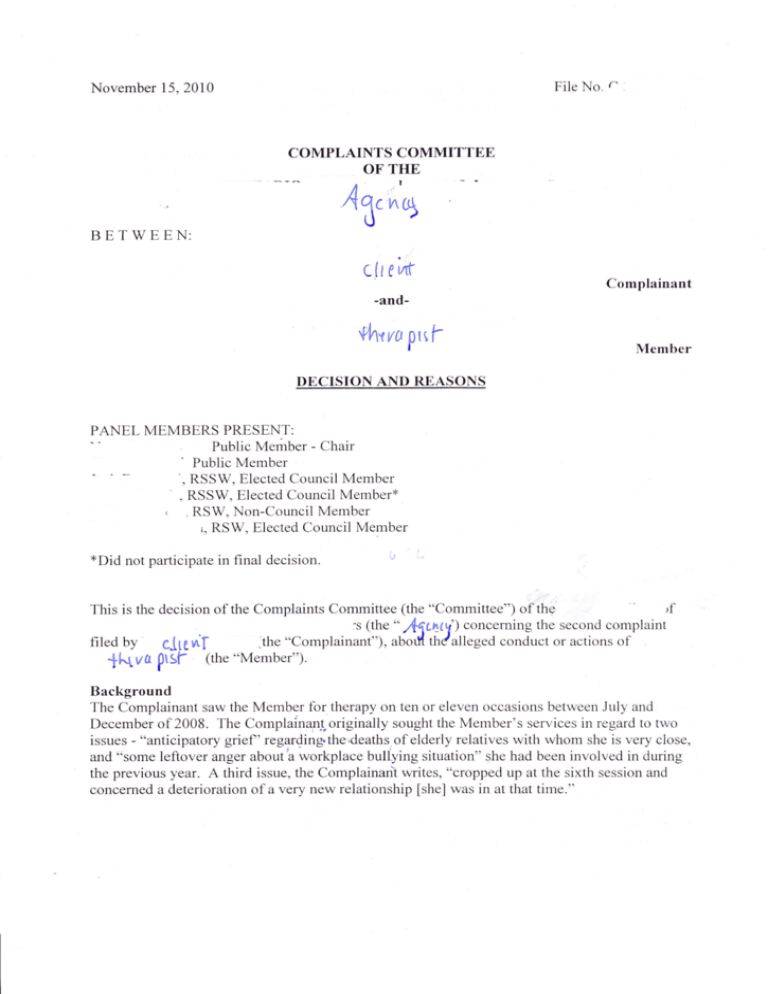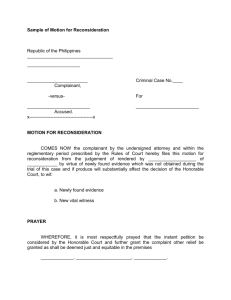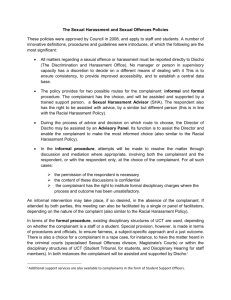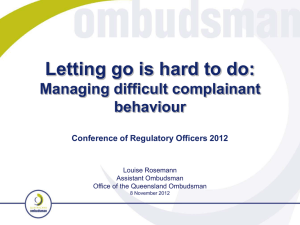response to complaint 2
advertisement

File No.
November 15,20i0
.
COMPLAINTS COMMITTEE
OF THE
--
A |
4'Qcna
d)
BETWE,EN:
ch e'a(
Complainant
-and-
thrraprrf
Member
DECISION AND REASONS
PANEL MEMBERS PRESENT:
Public Member - Chair
' Public Member
',
RSSW, Elected Council Member
' , RSSW,
Elected Council Member*
, , RSW, Non-Council Mernber
r, RSW, Elected Council Member
+Did not participate in final
decision.
i':
"
rf
This is the decision of the Complaints Committee (the "Committee") of the
's (the "
Aqquil concerning the second complaint
"Complainant"),
thdalleged conduct or actions of
abor*
filed by Cjttw[
.the
pts{- (the "Member").
ffuva
Background
The Complainant saw the Member for therapy on ten or eleven occasions between July and
December of 2008. The Complainan,t originally sought the Member's services in regard to two
issues - "anticipatory grief'regarding'the.deaths of elderly relatives with whom she is very close,
and "some leftover anger about'a workplace bullying situation" she had been involved in during
the previous year. A third issue, the Complainaril writes, "cropped up at the sixth session and
concerned a deterioration of a very new relationship [she] was in at that time."
The Complainant terminated the therapeutic relationship in January 2009. She then left the
Member a telephone message cancelling their next scheduled session and informing the Member
that she would not return to see her.
The first complaint concerned an allegation that the Member breached the Complainant's
confidentiality by leaving her a return voice-mail message, at the Complainant's workplace, on
January 13,2009, containing confidential information. The Committee's Decision and Reasons
in the hrst complaint, determining to take no further action in response to it, was issued to the
parties on September 9,2A10. The Committee will not, therefore, revisit this allegation in this
second Decision and Reasons.
The current, second complaint appears to concern tl.rg therapy itself. It was filed with the Coliege
on January 29,2010, approximately one year after the Complainant terminated her therapeutic
relationship with the Member because, at that time, the Cornplainant had just learned of new
information concerning the Member. This new information, the Complainant says, forms the
basis for her second complaint.
The Complaint
The Complainant writes that the "crux of [her] complaint ls that fthe Member] did not disclose to
[her] that she was taking a Gestalt approach to [her] therapy. and that without such a disclosureand given the inconsistencies in lthe Member's] online profiles, fthe Complainant] had no other
way to know." The Complainant believes this is a "case of misrepresentation and lack of
informed consent by omission". She also believes that, "Gestait therapy is a highly questionable
form of therapy." She maintains that it is unlikeiy that she would have agreed to Gestalt therapl,'
if she had known that the Member would use it in her work with the Complainant. She maintains
that, at the time, she did not know that Gestalt therapy existed or what it involved.
The Complainant's second allegation is that the- Mepber "claims" to be a "Clinical and Faculty
Member of the Gestalt Institute of the (tLg4tqt,in " when, the Complainant
maintains,
T'
J
-
d^
,..this institute no longer exists and the website [the Mernber] cites for it
is no longer online, and a Google search yields mainly Yellow Pagestype directory listihgs and the websites of other therapists who studied
there.
It all adds up to pretty dodgy representation of her qualifications.
..
The Member's Representations and Explanations
The Member writes that the Gestalt Institute of the (*h (f q f 1)n i is an educational institute
-k
established in 1988 and certified with the L
10v(rnA4^,d4q,pdtlf y^Lwf
i
Government of I
She graduated. she says, lrom
" r (6uv\l f;
the Institute in 1996 and, having collaborated with the Director on training and curriculum
development, was provided faculty membership in 2005. She maintains that, as at the date of her
letter responding to the complaint (March 1l,2010) the Institute is active. Concerning the status
of the Institute's website, the Director of the Institute informed her that it is being revised and
hopes to have a new site available in late spring,
The Member maintains that she has adhered to Principle VIi of the A1$tq's Standards of
Practice because hei website and marketing literature provide un u."uflr.- lepresentation of her
background and approach to working with clients. She writes that,
In addition to [her] grounding in tkrvag5 : and Gestalt, and in keeping with
the values of continued competency hnd professional development, [she has]
fuither training in specific modalities, including Cognitive Behavioural
Therapy, Emotional Focused Therapy, Mindfulness and Recovery from
Trauma. In keeping with [her] client-centred approach, all of these modalities
may be drawn fiom as appropriate in [her] work with a. client. [She believes]
that inclusion of [her] two years graduate studies in ftrvapl < and [her]
three years post-graduate studies in Gestalt, and fher] ongoirfg membership in
the {qnr11 and histitute, provides readers with an adequate and clear picture
of ftefl ba-ckground and training in these two schools.
The Member maintains that her current website was updated in the surrmer of 2009 and that,
previous to the update, she had a website available in 2008 when the Complainant was reviewing
her therapist options. The Member has not retained the details of the earlier website content, but
assures the Committee that as with her current website, it too was an accurate and representative
reflection ofher background and approach.
The Member maintains that potential clients obtain information about her from their refen'al
source: a colleague or physician, a community agency, her website or brochure, or friend/family
member who was a previous client. Agencies that refer clients to her have a registration process
and an accurate profile ofher background aqd approach. Upon request, she offers potential
clients aYrhour informational interview driring'which they rnay ask questions related to her
background and approach, in order to detetmine if they wish to work with her. Once an
individual has chosen to work with her, however, it is uncommon for her to spend time talking
about hersell her approach or background, unless a question was raised.
The Complainant, the Member says, was referred to her by the (O-Y\N\Unfu1 Q)enCq
This agepcy provides individuals with at leisr lfrree riurn"t
of therapists, as well as information on ho-w t6 select a therapist, including a list of questions to
ask a therapist during the selection process. it also informs individuals that they can request an
interview as part of this selection process. The Member say$her {ppointment records do not
indicate that the Complainant availed herself of this opportunitj,. The Member's records do
indicate, however, that the Complainant indicated in the first session that she had eliminated two
other possible choices, presumably through her own selection process.
The Complainant, the Member says, spent 1l sessiond'working through diffrcult and challenging
material. The Member found the Complainant to be cornmitted, engaged and open in her work.
The Member's "approach in working with her was primarily cognitive behavioural in nature
(reviewing thoughts and beliefs, reviewing past evidence and assessing current evidence) and due
to her presenting issue (self-described "anticipatory grief') an emotional focus was also present."
The Member believes her work with the Complainant was consistent with her presented
principles: respect, caring. and support and in iccordance with proper 'AJC^15 practice.
The Complainant's Reply
The Complainant provided the Committee with a ten-page reply to the Member's response to her
complaint. She emphasizes that,
,
,
... A client's failure to ask precisely
the right question in order to
elicit...information is not a free pass to practice whichever type of
therapy the therapist happens to prefer.
The Complainant's views appe,4r.to be based on her belief, "before this experience" that,
...therapists were meant to be impartiai listeners who might make i
occasional suggestions or put forward a few hypotheses, but who
otherwise believe that clients understand their circumstances and can
develop their own solutions. Any intervention or treatment stronger
than that would only proceed with the client's infbrmed consent,
especially if it is an unvalidated (sic), fringe type of therapy. I doubt
there are any questions a client can ask to find out in advance that their
therapist would do otherwise, or any sure way for a client to knor.l,
whelher the therapist had answered honestly.
.
Concerning the Member's representations in regard to the manner in which potential clients are
referred to her and how they might inform themselves About her services, the Complainant says
t;frl#. and "it did not occur to [her] to seek
she Googled ail the referrals she received from
multiple online profiles for any one therapist. to identify any inconsistencies among the profiles,
or to determine what the inconsistencies might mean for therapy."
The Complainant says she did not "probe for additionai information about fthe Member's]
training because [she] assumed that her online information was correct, as the onus is on the
therapist.to ensure,,that it is an accurate description, not on the prospectiv-e, client to double check.
During their interview, the Complainant maintains, she and the Member spoke -about the
Complainant's presenting problems..,and the Complainant told the Member that she had rejected
oil|:ltl because the therapist's online profile sounded too "New
one of the referrals made by
Agey" for her tastes. The Com$lai'nant also told the Member that "Sand Play Therapy" had been
suggested to her on one occasion, but after resEarching she decided it "was not for her." The
Complainant asked the Member if the Merflber would refer her to another therapist if the
Complainant raised issues or concerns outside her skill area, and the Member responded that she
would. "At no point during the discussion did fthe Member] mention any particular approach to
therapy or theoretical orientation."
The Complainant says, conceming the Member's representation that her work with the
Complainant was "mainly cognitive behavioural in nature", that based on her research conceming
this modality, "at most, perhaps some CBT was mixed in" and the phrase "cognitive behavioural"
was never mentioned.in any of the sessions. The Complainant writes that she "can only claim
that [the Member] was practicing on [her] the same therapy that she herself has claimed to
practice and to teach."
The Complainant now maintains that "neither CBT nor Gestalt Therapy is appropriate for all
clients or situations", and that the Member "would have had no way to determine what was
appropriate for lherl" because, she says,
o "Nothing like a comprehensive assessment took place." In this regard the Complainant relies
on the following phrases from two publications, Gestalt Counselling in Action and Skills in
Gestalt Counselling & Psychotherapj, - "Assessment for suitability in working witli a Gestalt
approach is a delicate process thoroughly grounded in intuition"; and "Taking a history is
antithetical to working as a Gestalt practitioner and...true Gestalt is simply an exploration of
'what the client brings' or 'what emerges." The Complainant maintains that the Member "did not
seek in any organized fashion any information about [her] family history, medical history,
previous experience with therapy, any psychiatric diagnoses, use of alcohol or drugs, suicide
attempts. etc. She would not know what, if any recurrent patterns of flawed thinking I may have,
because we never talked about it."
t&
o She and the Member never discussed therapy goals, a treatment plan, session agendas, or what
particular approach therapy would take. "Rather, each session was made up as it went along - but
not by explicit mutual agreement." In this regard the Complainant relies on another phrase from
Skills in Ge,stalt Counselling and Psychotherapy - "...some Gestaltists see treatment pianning as
incompatible with the formation of a dialogic relationship and with the natural. spontaneous
emergence of new meanings that flows from the health relational contact."
The Complainant provides the details of how she concluded that the Member "had been doing
d 'I
Gestalt Therapy" with her, as follows:
. She "quit" therapy with the Member in January 2009 because she "knew something was very
wrong with the therapy. There were finally too many red flags to ignore." She did not discuss this
decision with the Member.
. The Complainant says that "For the next several months [she] mulled over the situation and
what, if any.thing, [she] would do about it. In August 2009, when [she] decided to file [her] (first
complaint) re: confidentiality, [she] also decided to find out, if she] could. what had been happening
in the therapy sessions and what could account for the bizarce exchanges fshe] had had with [the
Memberl."
.
The Complainant began by reading about psychotherapy. psybhology and social work in general,
and looked into the Member's training in more detail. She noticed the Member's reference, on one
profilq; to training at the Gestalt institute of the (r
l&1iQ4 l. As she did not know, at that time,
I
'gestalt'
what
meant in the psychotherapy context, slfe re$earched that. She writes.
it did not take long before the penny dropped. When [she] read
an
article on Gestalt therapy techniques, [she] literally had a moment
when [she] thought, "So'that .i why she kept trying to get me to
talk to an empty chair."
Since then fshe has] researched Gestalt Therapy very
thoroughly...what [she] experienced as red flags and general
strangeness is consistent with the premises and techniques
of
Gestalt therapy.
Because [she] was certain that fshe and the Member] had never
discussed taking a Gestalt approach to therapy, [she] knew [she]
could not possibly have consented to it. [she] went back online to
hnd all of her profiles to see whether somewhere [the Member] has
stated plainly that she does Gestalt therapy and [she] had somehow
missed it.
Looking over [the Member's] profiles, [she] realized that it is not
at all clear whether or to what extent fthe Member] uses a Gestalt
approach in her work. Depending on which profile a prospective
client finds online, they might not have any idea that [the Member]
has any interest or exoerience with Gestalt. In that case, they must
rely on her to volunteer this information and to explain what that
may mean for their individual therapy. Therefore [she] hadn't
missed any information; it had not been provided to [her].
The Complainant maintains that the following are "specific examples of Gestalt therapy in her
sessions" with the Member:
r "Empty chair" - On several occasions the Member "would suggest that fshel pretend that a
certain person was sitting in the empty chair next to [her] and to speak to them as if they were there."
The Complainant says she "did pick up on this as some soft of technique, but fthe Mernber] never
introduced or explained it, she just randomly suggested.it, which I found very distracting and
counter-productive."
. "Body Awareness/Blocks to Energy" - The Member, the Complainant says, would "randomly
ask [her] what physical sensations fshe] was experiencing at that moment", never explained why she
was asking, and the Complainant felt it confusing to be intemrpted with questions about her physical
sensations when she was discussing what she considered to be the issue at hand. She would lose her
train of thought and the session would "go off in some other direction." She writes that "the Gestalt
notion that blocked energy is another form of resistance explains" this questioning and that she now
knows that "moment-by-moment shifts and changes are considered parl-and-parcel of Gestait
therapy sessions."
o "Therapist engagement/authentic contact" - The Complainant writes that the "Gestalt notion that
a therapist should be personally engaged with the client and show how the client is affecting them
explains an odd incident from the last session. The Complainant maintains that the Member's eyes
welled up with tears and she looked quittj up$et. The Complainant was also upset and found the
Member's reaction disturbing, thinking either that the Member's emotions were genuine and she was
not, therefore, detached enough to properly do her job, or her emotions were "fake" and "part of
some technique, and therefore very manipulative." In this regard, the Complainant relies on a phrase
excerpted from Theory and Practice of Counselling and Psychotherapy, Chapter 8, Gestalt Therapy
- "lt is important that therapists allow themselves to be affected by their clients and that they actively
share their own present perceptions and experiences as they encounter clients in the here-and-now."
. "Here and Now" - According to the Complainant, "Gestalt therapy is meant to enable a
spontaneous, moment-to-moment experience of the therapeutic engagement", and this accounts for
the Member's seeming not to remember what was discussed from one session to the next. The
Member, the Complainant says, never took notes while the Complainant was present, and the
Complainant "eventually pieced together from her ill-htting remarks and occasional blank looks that
she was not keeping track of the basic facts of my situation." For example, the Complainant says,
"in a few sessions", the Member suggested that between sessions, the Complainant keep a journal
about her concerns, so that these concerns qould be discussed at the next session. At the next
session, however, the Member did not mention the journal at all. At another session, the
Complainant "deliberately" did not mention the journal and waited to see if the Member would, but
the Member did not and the journal was not discussed. The Complainant writes,
difficulty was that [sheJ did not know [the Member] was
focusing on the 'here and now'. I did not know there was a brand of
therapy that had this focus. I assumed that there would be continuity
between sessions, and that [the Member] would understand my remarks
in the context of what had been said before, and that her responses would
be based on an understanding of that context. [HerJ responses were
based on that assumption. I think it is quite possible that she not only
forgot some of my facts, but also filled in the blanks with someone else's
facts. The result was that many of our sessions did not quite make sense.
The main
(Another possible explanation for this parl of the therapy may be the
Gestalt notion that content is less important than process, and that what
the client does not say can be equally or more important that what the
client does sav. . ..
.
"Reversal Exercise, or 'Frustrating the client". or CBT?" The Complainant refers to:
An Intemet link concerning Gestalt therapy which she cites as stating that "the reversal exercise
involrres prompting the client to do the opposite of their usual behaviours or to role play the opposite
of their symptoms in order to accept the personal attributes that they have tried to deny"; and,
The Gestalt Approach and Eyewitness Io Therapy, which she maintains includes the phrase that
"Frustration is part of the Gestalt process, intended to thwart the client's inauthentic being and
avoidances and the client's endeavour to manipulate the therapist."
The Complainant writes that her experience was that many sessions felt like "Opposite Day" because
"nearly every opinion or idea [she] expressed was second-guessed, doubted, and challenged." She
writes that she expects that the Member thoirght that her ideas and opinions were actually
"resistances to contact", but did not consider that at least some of the time they might be perfectly
sound, and seemed to think that the Complainant was wrong about everl-thing and would push hard
until she finally accepted another opinion. The Complainant uses the example of the voice-mail
message the Mernber left for her on January 13,2009 (the subject of the first complaint concerning
confidentiality), as an example of "how hard she would push against an idea she did not agree with."
The Complainant describes the voicemail,rnessage as,
...very long and rambling, and gives multiple reasons why I should call
her back (l see them as multiple hooks to reei me back in). The part
about "hoping your reasons for not coming back are good ones" is a
subtle version of the second-guessing, undermining type of comment
fthe Member] made frequently in the sessions. She could have simply
accepted that my decision was final and based on reasons that I found
satisfactory, and left it at that.
In this regard the Complainant relies on an excerpt from Sfrll/s in Gestalt Counselling &
Psychotherapy, stating "when a client wants to leave therapy 'prematurely' - you the therapist have
the right to fight for the 'potential ciient' - the vision of the growthful possibility that you see in her
Iclient]."
The Complainant provides another "especially odd example" of when she made a passing remark
about someone she knew who had an affair with a married man, which the Complainant thinks is
"a stupid thing to do." The Complainant says the Member responded, "Maybe she doesn't think
it's stupid. She got the man in the end, so for her it wasn't stupid." The Complainant says she
found it odd that the Member would take time during her therapy session to rationalize someone
else's involvement in infidelity."
Conceming the relationship the Complainant was in at the time, the Complainant describes the
following exchanges with the Member:
Complainant: I think he's just in it for the sex.
Member Maybe he just wants to get closer.
Complainant I don't trust him.
Men.rber
Why not.just trust him? Some people do. They just trust.
Complainant I feel like it's changed fiom his pursuing me to me pursuing him.
Member
So?
Complainant
He
Member
just gives me scraps of attention
He sent you an e-mail, which he didn't
have.
to do.
Complainant It's not good enough. I can't go on like this. ''
Member
Does he know how r,ttlnerable you are?
The Complainant maintains that whenever she voiced concern that ihe man would, at times, ignore
her, the Member made excuses for him, such as, "He's just busy", "He's just on a different
communication schedule", "He's just benignly oblivious". Once, the Complainant maintains, the
Member said "I think he reaily likes you." The Member never simply accepted her concems and
doubts and it was only when she finally agreed to give him another chance, give the relationship
more time, that the Member would "back off." The Complainant noted that the Member "considered
it appropriate of her to speculate on the motives and agenda of the man...but not appropriate for me
to do so, not if my speculations differed fiom hers.'' The Complainant maintains that she did not
know the Member was "conducting an exercise" and thought they were having a sincere discussion
and that her remarks were genuine, not "rhetorical or experimental." The Complainant writes,
I did not know that she had assumed the core problem was my flawed thinking,
or'disturbances of the contact boundary' or similar. Eventually [she figured
out that no matter what [her] opinion or ideas were, [the Member] would
dismiss or challenge them. ...
This is all the therapy really amounted to: Whatever you are thinking or
feeling, it's probably wrong, so stbp iq and tliink or feel something else.
Perhaps this is a blunt misapplication of the theory behind cognitive
behavioural therapy. While it may be true that sometimes a person's thoughts
may negatively affect their emotions, it does not follow that lvhenever
someone experiences a negative emotions, it is because their thoughts are
wrong. It is possible to feel bad about a situation while understanding it well
enough.
It would be inaccurate to say that every single thing that happened in the
sessions was consistent with Gestalt. Often the therapy iust felt like throwing
stuff at a wall to see what would stick. Nevertheless, Gestalt theories and
principles explain a lot about what [she] experienced. Gestalt therapy is based "
on a number of premises and assumptions that lshe isl sure were influencbs in
the sessions, e.g. the notion that what is experienced in the present moment
(the process) is more important than the content of what clients reveal; that
clients use language in order to conceal what they 'really' mean; that a cl,ient's
presenting problem is not the 'real' problem.
The main negative ellect of tliis experience was that [she] became
increasingly tearful, distressed and anxious - much, much worse than when
[she] started therapy. [The Member] did not regard this as a probiem. During
fherl last session...fshe] said "I feel mentally and emotionally exhausted" and
fthe Member] replied "That's because you've been doing a lot of work."
Later in that session [the Member] pitched me on why [she] should undertake
long term therapy with her, in order to "deal with all the shit" in fher] life...
fr.l.-Uer'sl explanation for [her] distressed state is the reason why
[she] did not discuss [her] decision to quit therapy with her. [She]
iin"
anticipated that fthe Member] would give [her] a "you have to get worse
before you get better" rationale for continuing with therapy. Also, since [the
Member] disagreed with so much of what [she] said during sessions, [she]
expected that a termination session would iust be more of the same.
[She] now thinkfs] that this whole situation could have been avoided if
fshe and the Member] had openly discussed and agreed upon a particular
approach to therapy, treatment'goals, and a plan. At the time [she] did
not kr-row that those were the standards of therapeutic practice.
Standards of Practice
The Committee's consideration of this complaint was assisted by the following provisions found
in r,.fXcIti's Standards of Practice (Second Edition)-
Principle I - Relationship with
Interpretation 1.1
tfqryr\
Clients
.embers participate together in setting and evaluation goals.
prffor.'fo.
\.
A
the relationship between College members and clients is identified.
Principle II - Competency and Integrity
Interpretation 2.2.7
members do not misrepresent professional qualifications, education,
ei$eri6nce or affi I iati on.
lk,ntq
Principle III - Responsibility to Clients
Interpretation 3.1
4ctf ry1 members provide clients with accurate and complete information
reftardfng the extent, nature and limitations of any services available to them.
Interpretation 3.8
may provide services andior products so long as the
,$qtU'tuq members
ptbvisi6n of these services and/or products are relevant and conform to
College standards. College members do not provide a service and/or product
that the member knows or ought reasonably to know is not likely to benefit the
clicnt.
Interpretation 3.9
,{Cr ntq members terminate professional services to clients when such services
'uld n"{o"ger required or requested. It is professional misconduct to
discontinue professional services that are needed unless:
the client requests the discontinuation,
i) '
ii) the client withdraws from the service,
iii) reasonable efforts are made to arrange alternative or replacement
services,
iu) the client is given a reasonable opportunity to arrange alternative or
replacement services, or
una ln the circumstances described in subparagraphs i. ii,, iii, or iv, the member
makes reasonable eflorts to hold a termination session with the client.
Principle VII - Advertising
Interpretation 7.1
/ltarymembers may advertise their services through public statements,
arlfiourfcements, advefiising media and promotional activities provided that
these:
l0
7.I.l
are not false and misleading, and that any factual information is
verifiable;
Interpretation 7.3
,Ac*f h1q members' education, training, and experience,
as
well as areas of
.'dlip./"r.e, professional affiliations and services are described in an honest
and accurate manner.
Decision
It is the Committee's determination that it will not take any further action in response to this
complaint.
The parties are not in agreement about whether the Member employed a Gestalt approach to the
Complainant's therapy. The Complainant maintains that there are aspects of the Member's
therapeutic approach which are consistent with her research concerning Gestalt Therapy, The
Member maintains that while she draws from numerous modalities, as appropriate, in her
therapeutic work with clients, her work with the Complainant was prirnarily cognitive
hehavioural in nature.
There is, however, insufficient information upon which the Discipline Cornrnittee, in the event of
a referral, might determine that the Member employed a Gestalt approach to the Complainant's
therapy. The "specific examples" of the Member's therapeutic approach that the Complainant
mainiains are "Gestalt Therapy" are equally consistent with a cognitive behavioural (reviewing
thoughts and beliefs, past evidence and assessing current evidence), ernotionally focused, or of a
mindfulness approach could be found by the Discipline Committee to be otherwise consistent
with
Yf rrr' /']J/4Ct,t4
?
standards.
"'..'^-'" -"
;,
*
This would be the case with, for example, the Member asking the Complainant about the
physical sensations she was experiencing at a particular moment, the Mernber's focus on the
"second.rpresent (or "here and now"), the sessions the Complainant experienced as being
guessed, doubted, [and] challenged", and the Member's telephone efforl'tp arrange a ter.drinatton
session with the Complainant
Even if there was information that could support a Discipline Committee finding that the
Member employed a Gestalt approach to the Complainant's therapy, the Complainant has not
described, and the Committee is not aware of any information, standard of practice or other
authority, upon which the Discipline Committee could, in the event of a refenal, finiithat:
o Gestalt Therapy is "a highly questionable form of therapy" ;
o Gestalt Therapy is a therapeutic modaiity inappropriate to the goals or pulposes for which
the Complainant sought therapy with the Member - "anticipatory griefl', anger in relation to
recent workplace bullying, and deterioration of a new relationship;
o The Member was required to disclose to the Complainant, and seek her consent to every
therapeutic aspect or modality she might employ in providing therapy to the Complainant,
even if that was possible; or that
11
.
The services provided by the Member, to the limited extent to which they are described
by the parties, were irrelevant or otherwise not in conformity with the College's standards.
In her second allegation, the Complainant alleges that the Member falsely claims to be a clinical
and that that institution no
and faculty member of the Gestalt Institute of the
(rh [tff avt
longer exists. The Committee is, however in receipt
otu.dpy of tn" Member's Certificato of
StrSirf-tl$& ,,
on'June
Post Graduate Intensive Training issued to her by I ^td{
with
the
Psychotherapy
Gestalt
Association and with
23,1996, and'confirming her registration
information confirming that the Institute's website is being revised. Based on this information,
and in the event of a referral, the Discipline Committee could find that the Member's description
and representations in relation to her Gestalt Therapy qualification were accurate, truthful and
verifiable.
For all of the above reasons it is the Committee's decision that the allegations comprising the
complaint do not wanant referral to the Discipline Committee of the
-, , and that it will take
no further action in response to this complaint.
7.
Date
, Chair
l2





